
awesome-chatgpt
🤖 Awesome list for ChatGPT — an artificial intelligence chatbot developed by OpenAI
Stars: 4862
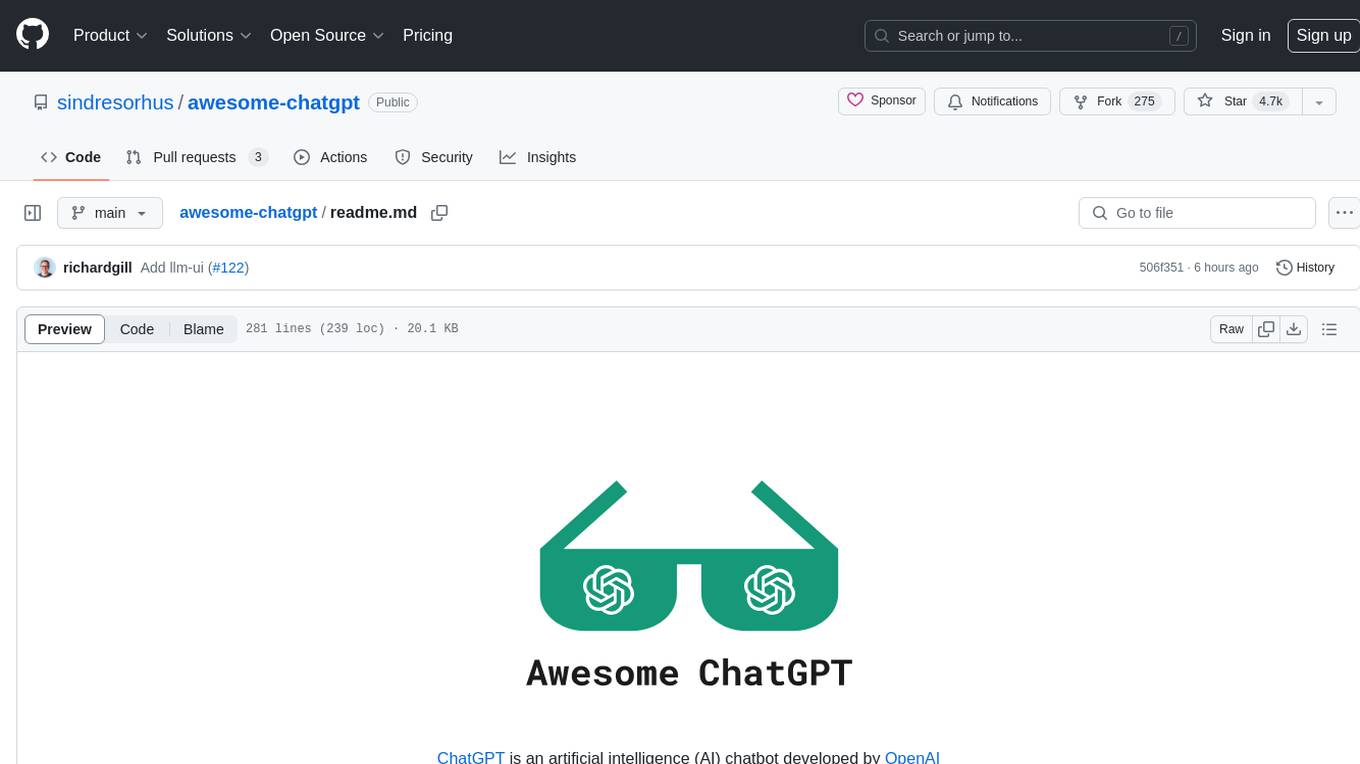
Awesome ChatGPT is an artificial intelligence chatbot developed by OpenAI. It offers a wide range of applications, web apps, browser extensions, CLI tools, bots, integrations, and packages for various platforms. Users can interact with ChatGPT through different interfaces and use it for tasks like generating text, creating presentations, summarizing content, and more. The ecosystem around ChatGPT includes tools for developers, writers, researchers, and individuals looking to leverage AI technology for different purposes.
README:
- Official
- Apps
- Web apps
- Browser extensions
- CLI tools
- Bots
- Integrations
- Packages
- Articles
- Community
- Related lists
- QuickGPT - Access the ChatGPT web UI from the menu bar, Dock, or using a keyboard shortcut on macOS.
- MacGPT - Native macOS app with a global prompt and also a web UI wrapper.
- Chatterbox - Native macOS app that can be shown with a keyboard shortcut.
- WriteMage - Native macOS app to use ChatGPT in any app. ($)
- PaletteBrain - Native macOS app to use ChatGPT in any app. ($)
- Machato - Native macOS app. ($)
- wonderGPT - Native macOS app with a focus on simplicity.
- Petey - Native iOS and watchOS app. ($)
- IntelliBar - macOS app that can be shown with a keyboard shortcut. ($ · Electron)
- Ask AI - Native watchOS app. ($)
- Chat Answer - Native iOS and Android app.
- Chat AI Desktop App - Cross-platform web UI wrapper.
- ChatGPT Desktop Application - Cross-platform web UI wrapper. (Electron)
- ChatGPT Android - Native Android app.
- ChatARKit - iOS app for creating AR experiences with natural language.
- Delphi ChatGPT - Native cross-platform app.
- Chatbox - Cross-platform app.
- Short Circuit - Native iOS and macOS app with support for Siri, Shortcuts, and more. ($)
- ChatBoost - Native Android app with support for Azure voice, custom prompts, and more. ($)
- Developer Duck - Native developer-focused macOS app with Xcode plugin and command line support. ($)
- Hello History - Chat with historical figures on iOS and Android. ($)
- Actions - Use ChatGPT from the Shortcuts app on iOS and macOS.
- EasyChat AI - Native Windows app using the latest Windows 11 design lanquage.
- pgMagic - macOS app that lets you query your PostgreSQL database using natural language. ($)
- Atua - macOS app to use ChatGPT in any app. ($)
- 16x Prompt - Cross-platform app to add source code and formatting instructions into prompt for coding tasks. ($)
- AI Chat - Cross-platform app that provides quick access to chatbots like ChatGPT from the menu bar. (Electron)
- ScreenSnapAI - Native macOS app to chat about captured screenshots. ($)
- ShareGPT - Share permanent links to ChatGPT conversations.
- Anse - Alternative ChatGPT web UI.
- chatbot-ui - Alternative ChatGPT web UI.
- ChatGPT Next Web - Alternative ChatGPT web UI.
- roomGPT - Generate your dream room.
- DocsGPT - Documentation assistant.
- promptsandbox - Visual programming tool for experimenting with ChatGPT.
- Adrenaline - Talk to your codebase.
- DeepWrite AI - Blog post generator.
- Chat with GPT - Open-source ChatGPT web app with a voice.
- FastChat - An open platform for training, serving, and evaluating large language model based chatbots.
- kindle-gpt - Search and chat on your Kindle highlights.
- eslint-gpt - Generate ESLint rules from example code.
- chatgpt-i18n - Localize your websites.
- AgentGPT - Autonomous AI agents in your browser.
- OP Vault ChatGPT - Give ChatGPT long-term memory using the OP Stack (OpenAI + Pinecone Vector Database).
- chatgpt-demo - Minimal web UI for ChatGPT.
- pdfGPT - Interactive conversations with the contents of PDF files.
- Chat Chat - Your own unified AI interface.
- VLog - Convert videos to documents.
- Ask-Anything - ChatGPT with video understanding and communication.
- TaskMatrix - Combines ChatGPT with Visual Models for enhanced image-chat interactions.
- OpenChat - Personalized ChatGPT chatbot.
- gpt-code-ui - Code interpreter integrated with ChatGPT.
- ai-chatbot - Personalized ChatGPT AI chatbot.
- Open Interpreter - Code interpreter with ChatGPT.
- Web3-GPT - Deploy smart contracts with ChatGPT.
- CometLLM - Open-source UI to log, visualize, and search your prompts, chains, and prompt variables.
- OpenAgents - Open-source replicate of ChatGPT Plus products including code interpreter, plugins and web browsing.
- TypingMind - Alternative web UI.
- ChatKit - Refined ChatGPT UI with support for plugins and accessing external resources.
- Humata.ai - Ask anything about your files.
- Epic Music Quiz - Create your own custom music video quiz.
- FlexGPT - Like ChatGPT but for pros, with long-term memory, internet access, unlimited GPT-4, and no subscription.
- LearnGPT - Title-based book creation. ($)
- Wielded - Web UI that works for OpenAI, Azure, Anthropic, and AWS Bedrock. Free for individuals.
- Auto-GPT - An experimental open-source attempt to make GPT-4 fully autonomous.
- ChatGPT-Paper-Reader - Read and summarize academic papers.
- Sidekick - Connect external data to ChatGPT APIs through a dashboard.
- twitterbio - Generate your Twitter bio.
- Beelzebub - Secure honeypot framework.
- ChatGPT-Python-Applications - A collection of Python web apps.
- ChatGPT for Google - Display ChatGPT response alongside search engine results.
- ChatGPT Prompt Genius - Discover, share, import, and use the best prompts for ChatGPT.
- ChatGPT Box - Deep ChatGPT integrations in your browser.
- ChatGPT Export and Share - Download your ChatGPT history to PNG, PDF or a sharable link.
- Superpower ChatGPT - Enhance the ChatGPT web UI with search history, create folders, export all chats, pin messages, and access thousands of prompts.
- chatgpt-google-summary-extension - Display ChatGPT summaries alongside Google search results, YouTube videos, etc.
- FancyGPT - Save and share beautiful ChatGPT snippets as images, PDFs, and text files.
- WritingMate.ai - Writing assistant.
- Summarize - Summarize websites.
- WebChatGPT - Enable web access in ChatGPT.
- ChatGPT for Chrome & YouTube Summary - Access ChatGPT from the Chrome toolbar, see transcripts of YouTube videos, and summarize YouTube videos.
- ChatGPT Enhancement Extension - Enhancements to the ChatGPT web UI.
- ChassistantGPT - Chrome browser extension that embeds ChatGPT as a hands-free voice assistant.
- Talk-to-ChatGPT - Talk with ChatGPT using your voice and listen to answers.
- ChatGPT for Google Colab - Embed ChatGPT inside Google Colab.
- codereview.gpt - Reviews your pull requests.
- GPT2Markdown - Export your ChatGPT conversations to Markdown.
- ChatGPT Widescreen Mode - Adds widescreen and fullscreen mode to ChatGPT.
- ChatGPT Infinity - Makes ChatGPT automatically answer random questions to increase your knowledge.
- Meeper - Transcriptions, summary and more using ChatGPT and Whisper AI for meetings and any browser tab.
- YouTube Summary by TubeSum - Summarize YouTube videos.
User scripts
- ChatGPT Exporter - Export and share ChatGPT conversation history.
- KeepChatGPT - Fixes common networks errors and problems with ChatGPT.
- ChatGPT Widescreen Mode - Adds widescreen and fullscreen mode to ChatGPT.
- Autoclear ChatGPT History - Auto-clear ChatGPT conversation history for increased privacy.
- ChatGPT Auto Refresh - Keeps ChatGPT sessions fresh to avoid network errors and Cloudflare checks.
- DuckDuckGPT - Brings the magic of ChatGPT to search results.
- ChatGPT Infinity - Makes ChatGPT automatically answer random questions to increase your knowledge.
- ChatGPT Auto-Continue - Automatically clicks "Continue generating" when responses are cut off.
Bookmarklets
- Conversation Saving - Save your ChatGPT conversation.
- ChatGPT Export - Export ChatGPT conversations to Markdown files.
- Assistant CLI - Use ChatGPT from the command-line.
- SearchGPT - Connect ChatGPT with the Internet.
- chatgpt-conversation - Have a conversation with ChatGPT.
- CLI for ChatGPT - Interactive interface for ChatGPT.
- chat-gpt-ppt - Automatically generate PowerPoint presentations.
- StackExplain - Have your error messages explained in plain English.
- clevercli - ChatGPT-powered command-line utilities.
- README-AI - Automatically generate README files.
- aicommits - Automatically generate Git commit messages.
- happycommit - Automatically generate Git commit messages.
- commit-assist - Automatically generate Git commit messages.
- cz-git - Automatically generate Git commit messages.
- ai-commit - Automatically generate conventional Git commit messages.
- gptcommit - Git hook for authoring commit messages.
- autodoc - Automatically generate codebase documentation.
- GPT3 WordPress Post Generator - Generate WordPress blog posts.
- aiac - Infrastructure-as-Code generator.
- tenere - Terminal interface (TUI) for ChatGPT written in Rust.
- shellChatGPT - Use ChatGPT from the command-line.
- Shell Genie - Interact with the terminal in plain English.
- ShellGPT - Use ChatGPT from the command-line.
- chatGPT-shell-cli - Use ChatGPT from the command-line. Shell script.
- aifiles - Organize and manage your files using AI.
- chatgpt-twitter-bot - Twitter bot.
- chatgpt-telegram-bot-serverless - Telegram bot.
- chatgpt-telegram - Telegram bot.
- myGPTReader - Slack bot.
- ChatGPTSlackBot - Slack bot.
- ChatGPT Discord Bot - Discord bot.
- chatgpt-discord - Discord bot.
- kubernetes-chatgpt-bot - Kubernetes bot.
- CodeReview Bot - GitHub Actions bot.
- openai-pr-reviewer - GitHub Actions bot.
- chatgpt-create-unit-tests - GitHub Actions bot that analyses a pull request and adds unit tests if necessary.
- gpt4-pdf-chatbot-langchain - Chatbot for large PDF files.
- wechat-chatgpt - Wechat bot.
- Chat Bling - WhatsApp bot.
- chatgpt-telegram-bot - Telegram bot that supports voice messages.
- DuckDuckGPT - DuckDuckGo bot.
- BraveGPT - Brave Search bot.
- chatgpt-raycast - Raycast extension.
- mpociot/chatgpt-vscode - VSCode extension.
- gencay/vscode-chatgpt - VSCode extension.
- org-ai - Emacs org-mode.
- vim-chatgpt - Vim plugin.
- ChatGPT.nvim - Neovim plugin.
- ChatGPT Jetbrains - Jetbrains plugin.
- DocGPT - Writing assistant for Google Docs.
- docGPT - Use ChatGPT in Google Docs.
- SlidesAI - Create AI-powered presentations in Google Slides.
- WordGPT - Use ChatGPT in Microsoft Word.
- Add ChatGPT to Microsoft Word - How to integrate ChatGPT with Microsoft Word.
- Open Assistant Helper - Improve Open Assistant with ChatGPT.
- ChatGPTWizard - Embarcadero RAD Studio (Delphi & C++ Builder) plugin.
- AICommand - ChatGPT integration with Unity Editor.
- AI Shader - ChatGPT-powered shader generator for Unity.
- Translate GPT - A fastlane plugin that provides an action to translate localizable strings using ChatGPT.
- PandasAI - Integrate ChatGPT capabilities into Pandas.
- Plus AI for Google Slides - Create AI-powered presentations in Google Slides.
- Scikit-LLM - Integrate ChatGPT capabilities into scikit-learn.
- ChatGPT-MD - ChatGPT integration with Obsidian note-taking software.
- Chapyter - Integrate ChatGPT capabilities into Jupyter Notebook.
- I Don't Care About Commit Message - Auto-generate commit messages and push actions in VS Code.
- chatgpt.js - Easy interaction with the ChatGPT DOM.
- Vercel AI SDK - An open source library for building AI-powered user interfaces.
- llm-ui - An open source library for building UIs for LLMs.
- GPTCache - Semantic cache to store responses from LLM queries.
- knowledge-gpt - Extract knowledge from information sources.
- doctorgpt - Diagnosing web app log errors with ChatGPT.
- Create your first app using ChatGPT - Learn how to build an app that enables users to improve their writing by rephrasing text.
- Stream data from ChatGPT with JavaScript - Learn how to consume streaming data from ChatGPT using vanilla JavaScript.
- awesome-chatgpt-prompts - Prompt curation.
- awesome-whisper - Whisper is an AI-powered speech recognition system.
For Tasks:
Click tags to check more tools for each tasksFor Jobs:
Alternative AI tools for awesome-chatgpt
Similar Open Source Tools

awesome-chatgpt
Awesome ChatGPT is an artificial intelligence chatbot developed by OpenAI. It offers a wide range of applications, web apps, browser extensions, CLI tools, bots, integrations, and packages for various platforms. Users can interact with ChatGPT through different interfaces and use it for tasks like generating text, creating presentations, summarizing content, and more. The ecosystem around ChatGPT includes tools for developers, writers, researchers, and individuals looking to leverage AI technology for different purposes.
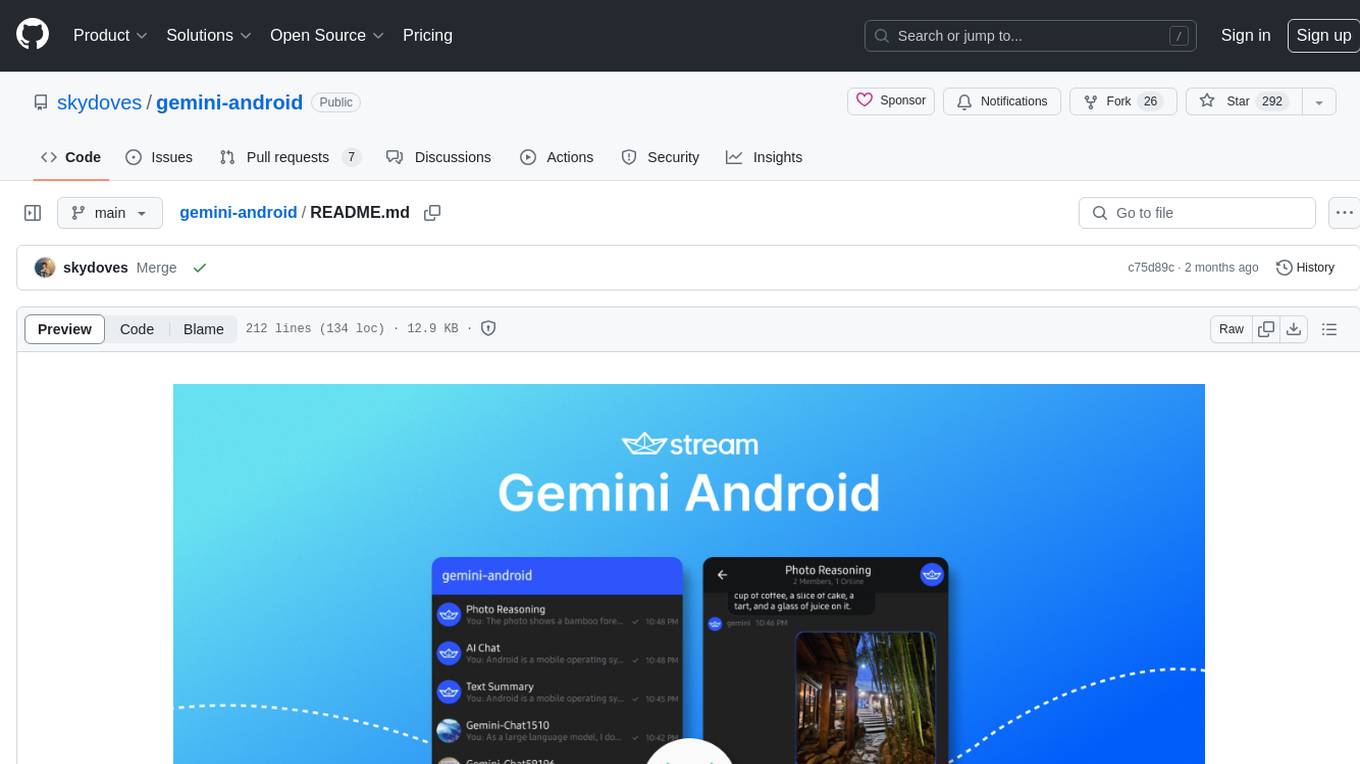
gemini-android
Gemini Android is a repository showcasing Google's Generative AI on Android using Stream Chat SDK for Compose. It demonstrates the Gemini API for Android, implements UI elements with Jetpack Compose, utilizes Android architecture components like Hilt and AppStartup, performs background tasks with Kotlin Coroutines, and integrates chat systems with Stream Chat Compose SDK for real-time event handling. The project also provides technical content, instructions on building the project, tech stack details, architecture overview, modularization strategies, and a contribution guideline. It follows Google's official architecture guidance and offers a real-world example of app architecture implementation.
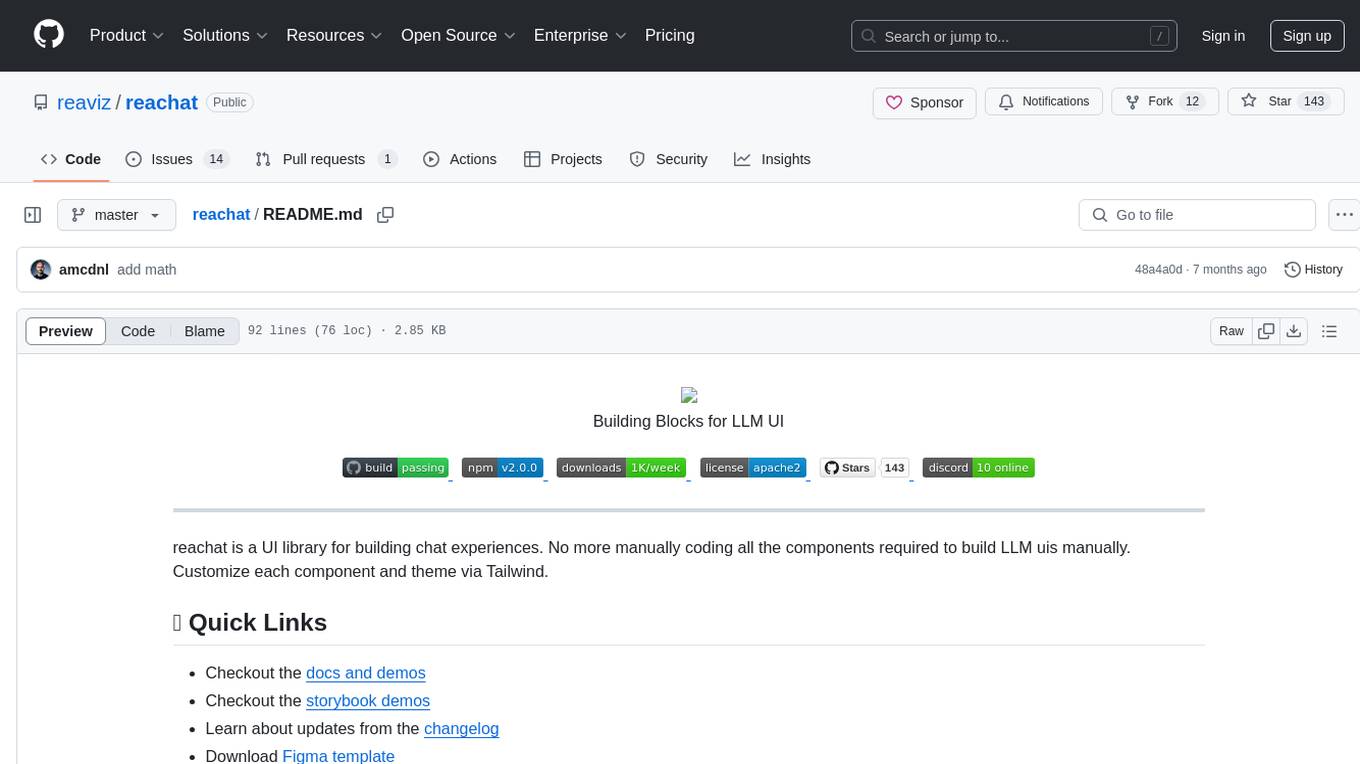
reachat
Reachat is a UI library designed for building chat experiences without the need for manual coding of components. Users can customize each component and theme using Tailwind. The library offers features such as console and companion modes, markdown rendering, code highlighting, tables, JSON support, math rendering, YouTube embeds, file uploads, message sources, animations, conversation pagination, keyboard shortcuts, responsive design, and more. Reachat is highly customizable and suitable for creating interactive chat interfaces.

AIProxyBootstrap
AIProxyBootstrap is a collection of starter apps designed to help users build their own experiences using AIProxy. The sample apps are categorized by services such as OpenAI, Anthropic, etc. Each app provides a template for users to add their AIProxy constants and implements API calls using AIProxySwift. Users can follow the provided instructions to customize the apps for their needs and interact with the AIProxy backend through the iOS simulator.

CodeGPT
CodeGPT is an extension for JetBrains IDEs that provides access to state-of-the-art large language models (LLMs) for coding assistance. It offers a range of features to enhance the coding experience, including code completions, a ChatGPT-like interface for instant coding advice, commit message generation, reference file support, name suggestions, and offline development support. CodeGPT is designed to keep privacy in mind, ensuring that user data remains secure and private.
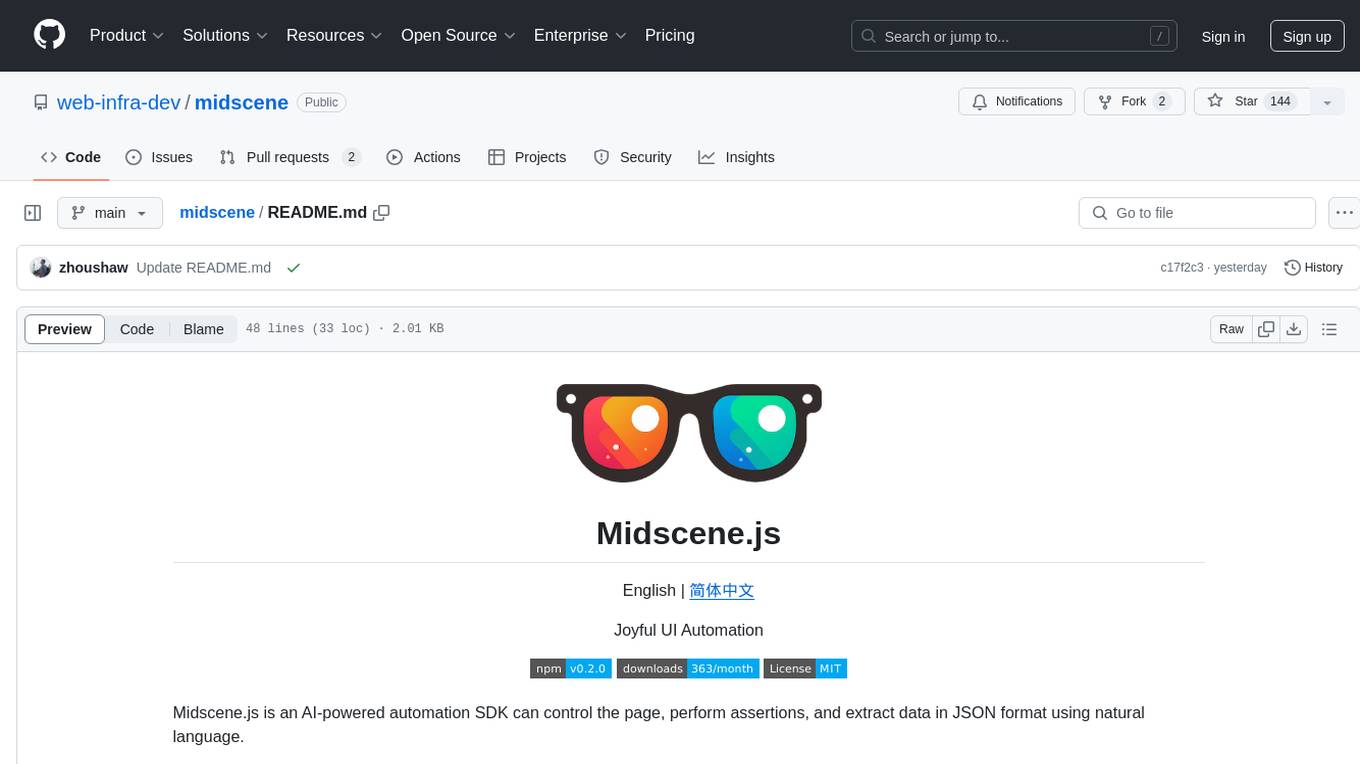
midscene
Midscene.js is an AI-powered automation SDK that allows users to control web pages, perform assertions, and extract data in JSON format using natural language. It offers features such as natural language interaction, understanding UI and providing responses in JSON, intuitive assertion based on AI understanding, compatibility with public multimodal LLMs like GPT-4o, visualization tool for easy debugging, and a brand new experience in automation development.
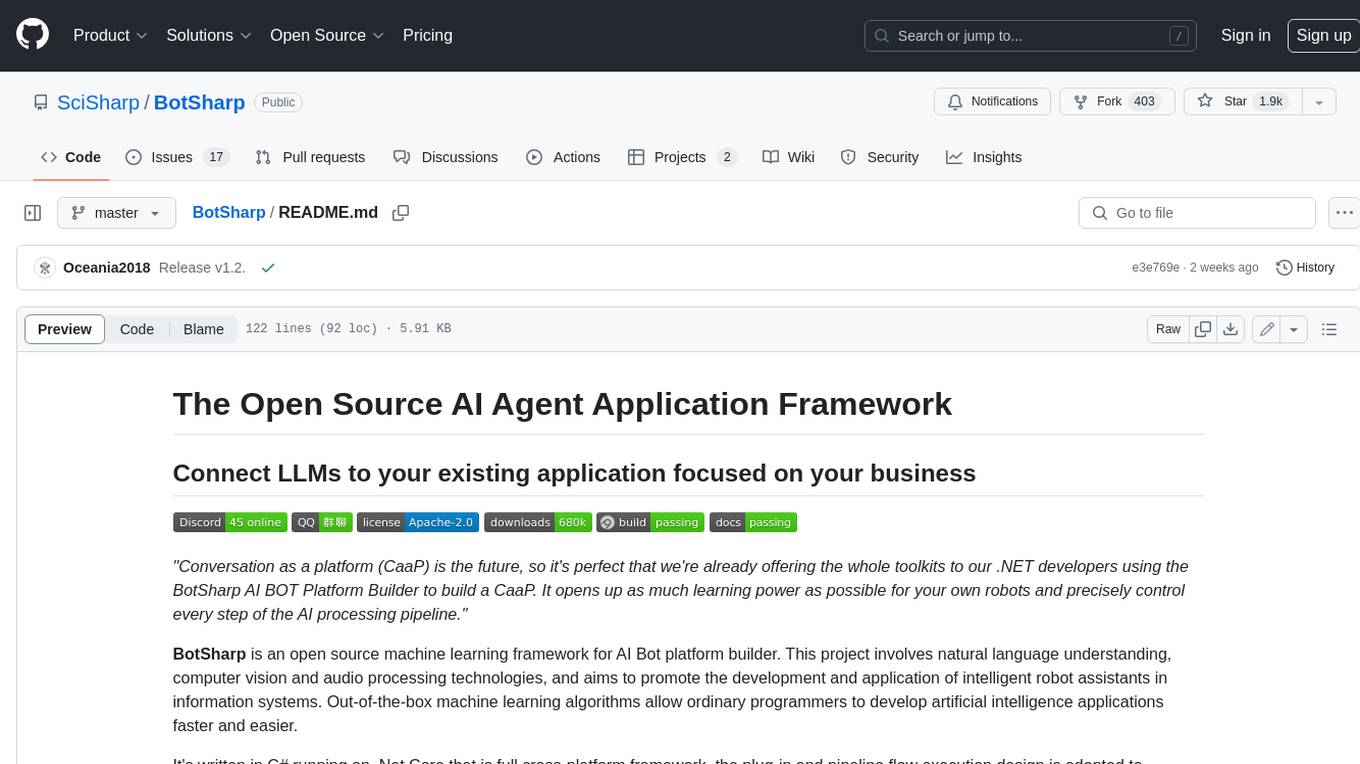
BotSharp
BotSharp is an open-source machine learning framework for building AI bot platforms. It provides a comprehensive set of tools and components for developing and deploying intelligent virtual assistants. BotSharp is designed to be modular and extensible, allowing developers to easily integrate it with their existing systems and applications. With BotSharp, you can quickly and easily create AI-powered chatbots, virtual assistants, and other conversational AI applications.
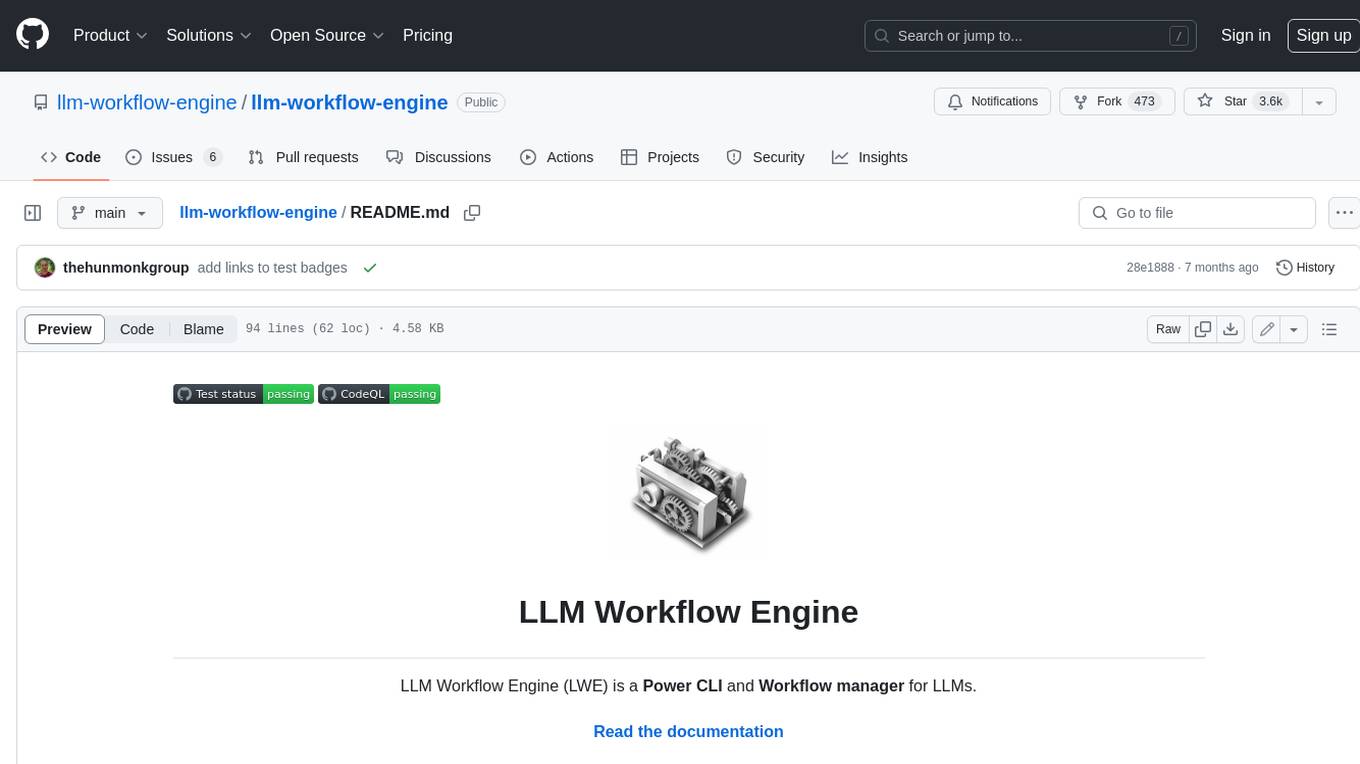
llm-workflow-engine
LLM Workflow Engine (LWE) is a powerful command-line interface (CLI) and workflow manager for large language models (LLMs) like ChatGPT and GPT4. It allows users to interact with LLMs directly from their terminal, making it easy to automate tasks and build complex workflows. LWE supports the official ChatGPT API, providing access to all supported models through your OpenAI account. Additionally, it features a simple plugin architecture that enables users to extend its functionality and integrate with other LLMs. LWE also offers a Python API for integrating LLM capabilities into Python scripts. Notable projects built using the original ChatGPT Wrapper, which LWE evolved from, include bookast, ChatGPT.el, ChatGPT Reddit Bot, Smarty GPT, ChatGPTify, and selection-to-chatgpt.
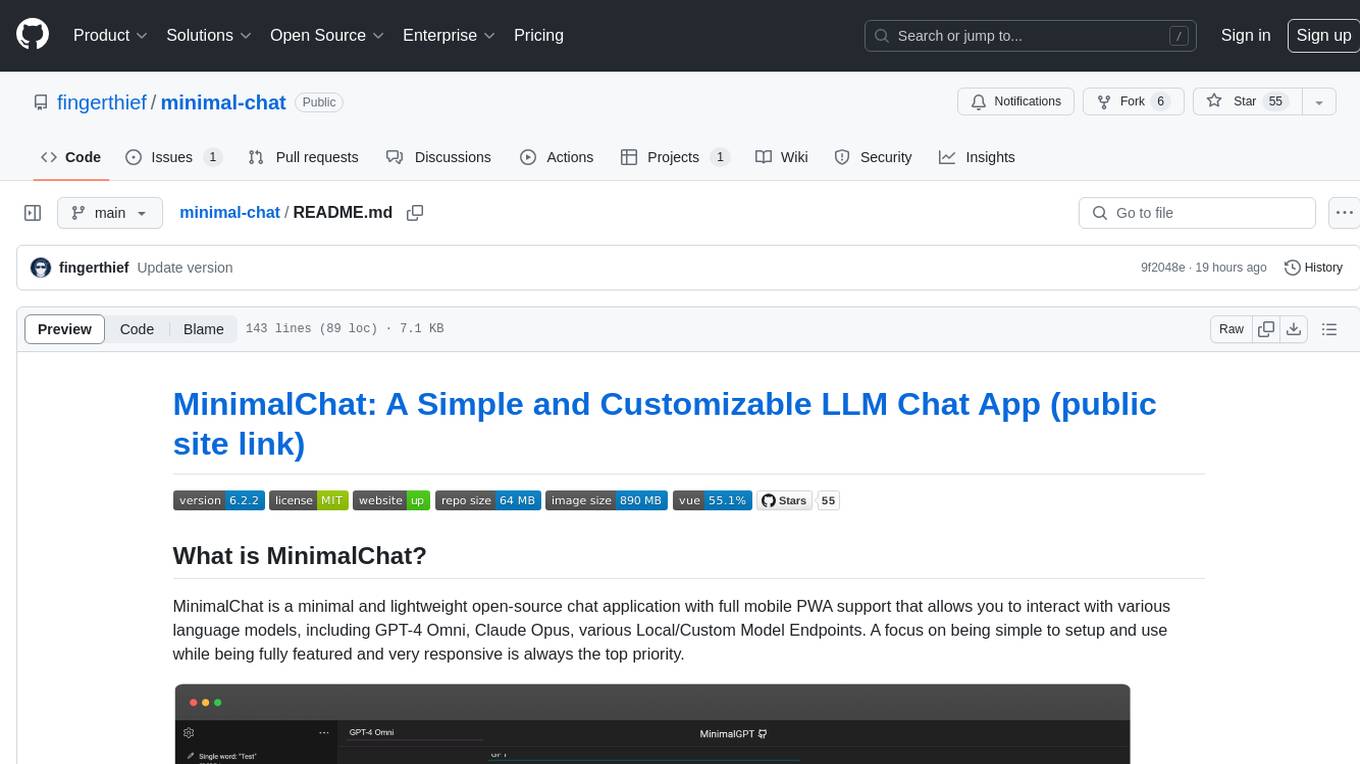
minimal-chat
MinimalChat is a minimal and lightweight open-source chat application with full mobile PWA support that allows users to interact with various language models, including GPT-4 Omni, Claude Opus, and various Local/Custom Model Endpoints. It focuses on simplicity in setup and usage while being fully featured and highly responsive. The application supports features like fully voiced conversational interactions, multiple language models, markdown support, code syntax highlighting, DALL-E 3 integration, conversation importing/exporting, and responsive layout for mobile use.
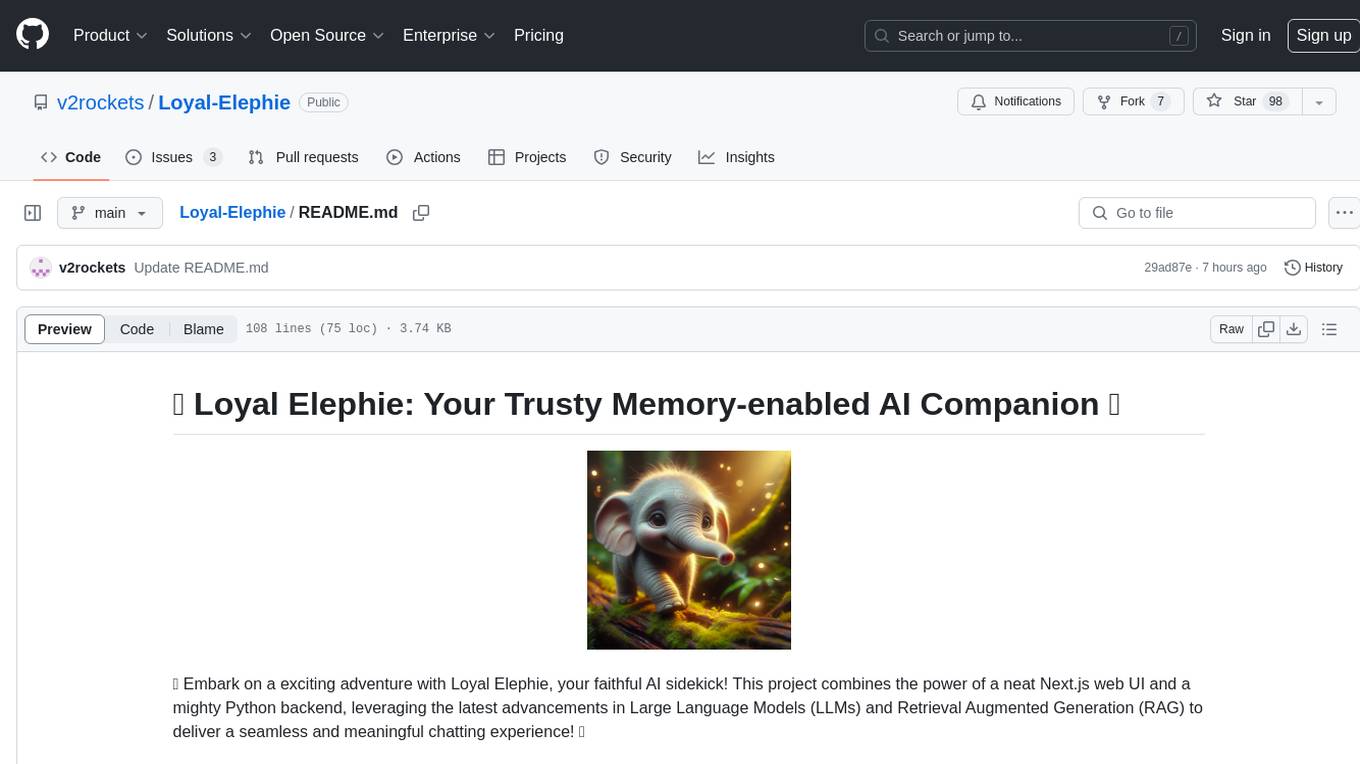
Loyal-Elephie
Embark on an exciting adventure with Loyal Elephie, your faithful AI sidekick! This project combines the power of a neat Next.js web UI and a mighty Python backend, leveraging the latest advancements in Large Language Models (LLMs) and Retrieval Augmented Generation (RAG) to deliver a seamless and meaningful chatting experience. Features include controllable memory, hybrid search, secure web access, streamlined LLM agent, and optional Markdown editor integration. Loyal Elephie supports both open and proprietary LLMs and embeddings serving as OpenAI compatible APIs.

gptme
GPTMe is a tool that allows users to interact with an LLM assistant directly in their terminal in a chat-style interface. The tool provides features for the assistant to run shell commands, execute code, read/write files, and more, making it suitable for various development and terminal-based tasks. It serves as a local alternative to ChatGPT's 'Code Interpreter,' offering flexibility and privacy when using a local model. GPTMe supports code execution, file manipulation, context passing, self-correction, and works with various AI models like GPT-4. It also includes a GitHub Bot for requesting changes and operates entirely in GitHub Actions. In progress features include handling long contexts intelligently, a web UI and API for conversations, web and desktop vision, and a tree-based conversation structure.
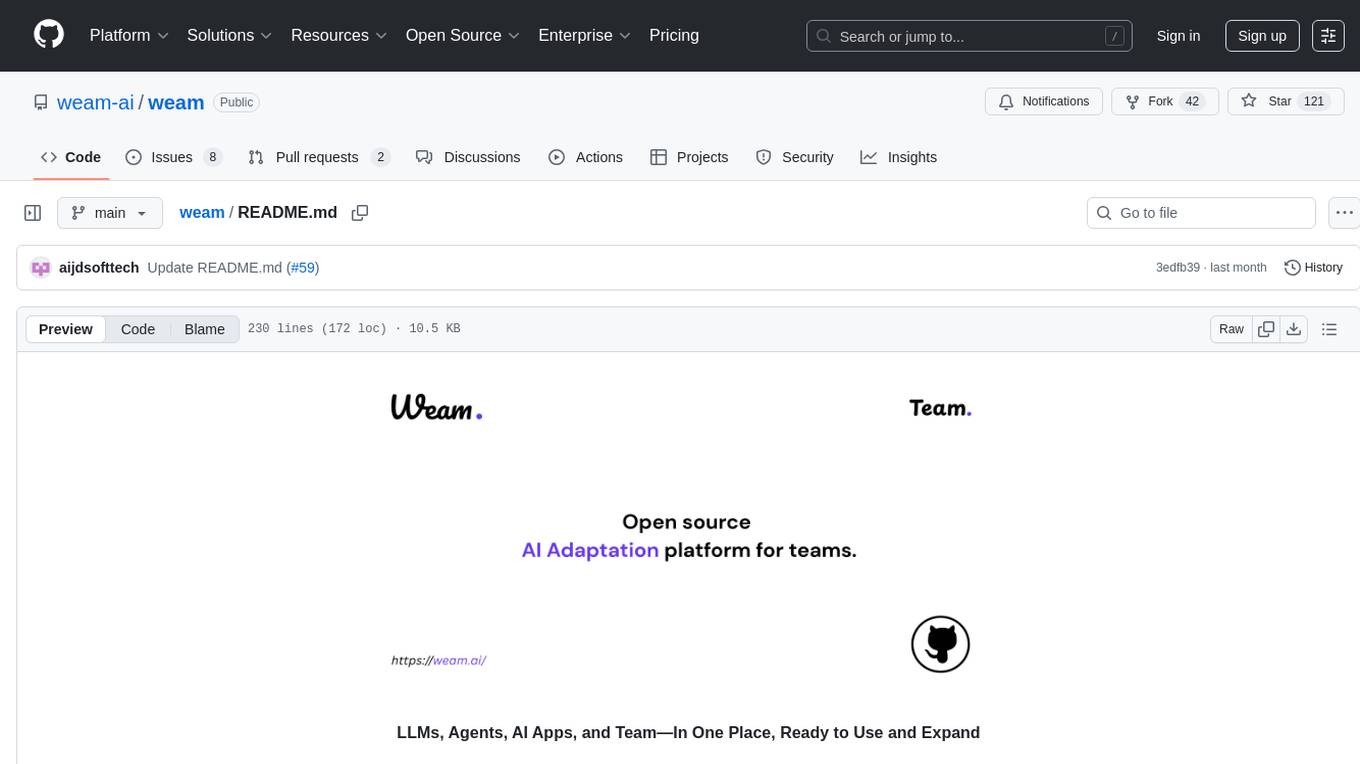
weam
Weam is an open source platform designed to help teams systematically adopt AI. It provides a production-ready stack with Next.js frontend and Node.js/Python backend, allowing for immediate deployment and use. Weam connects to major LLM providers, enabling easy access to the latest AI models. The platform organizes AI interactions into 'Brains' for different departments, offering customization and expansion options. Features include chat system, productivity tools, sharing & access controls, prompt library, AI agents, RAG, MCP, enterprise features, pre-built automations, and upcoming AI app solutions. Weam is free, open source, and scalable to meet growing needs.
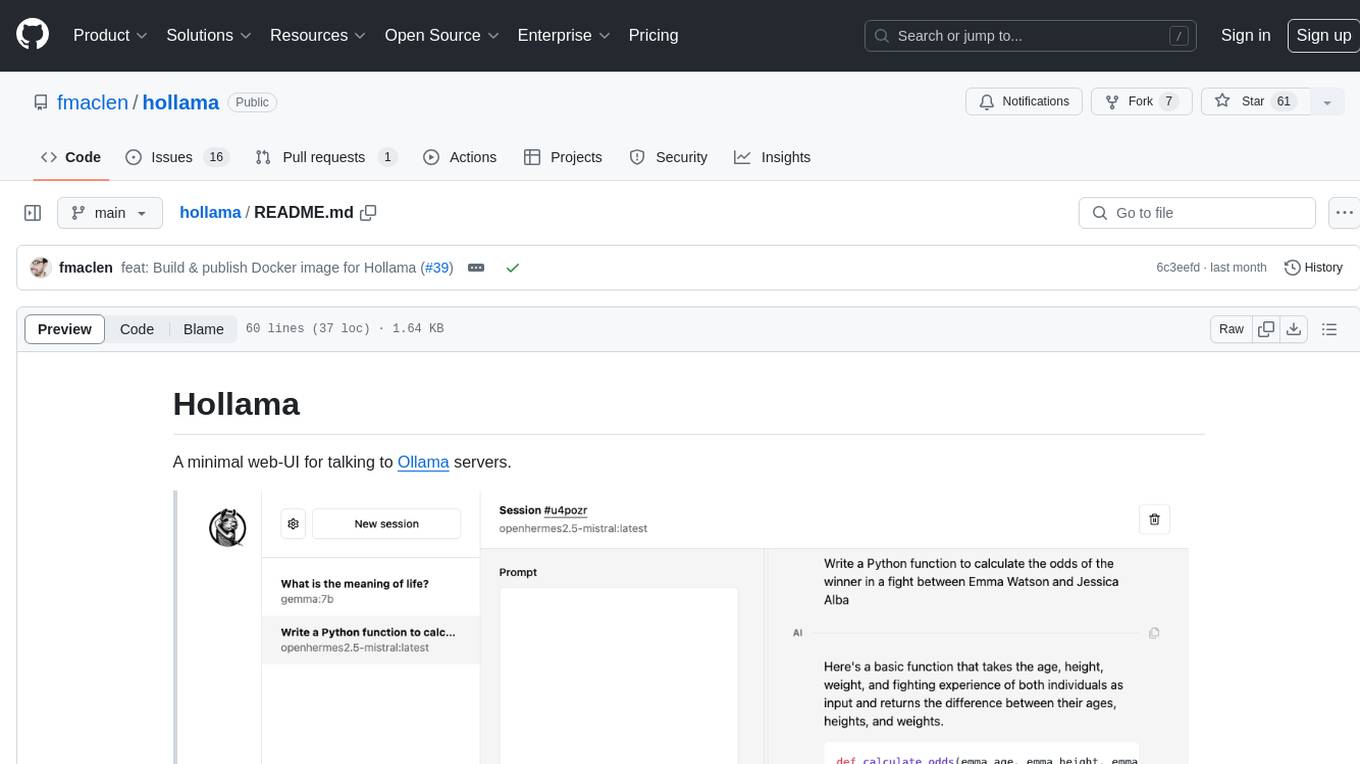
hollama
Hollama is a minimal web-UI tool designed for interacting with Ollama servers. It features large prompt fields, streams completions, ability to copy completions as raw text, Markdown parsing with syntax highlighting, and saves sessions/context in the browser's localStorage. Users can access the latest version of Hollama at https://hollama.fernando.is without sign up, and data is stored locally on the browser. The tool can also be run as a Docker image by executing a specific command. Developers can connect to an Ollama server by updating the ORIGIN settings. Hollama facilitates easy development by providing instructions to set up the environment, install dependencies, and start a development server. Building a production version of the app is straightforward with a single command, and deployment may require installing an adapter for the target environment.
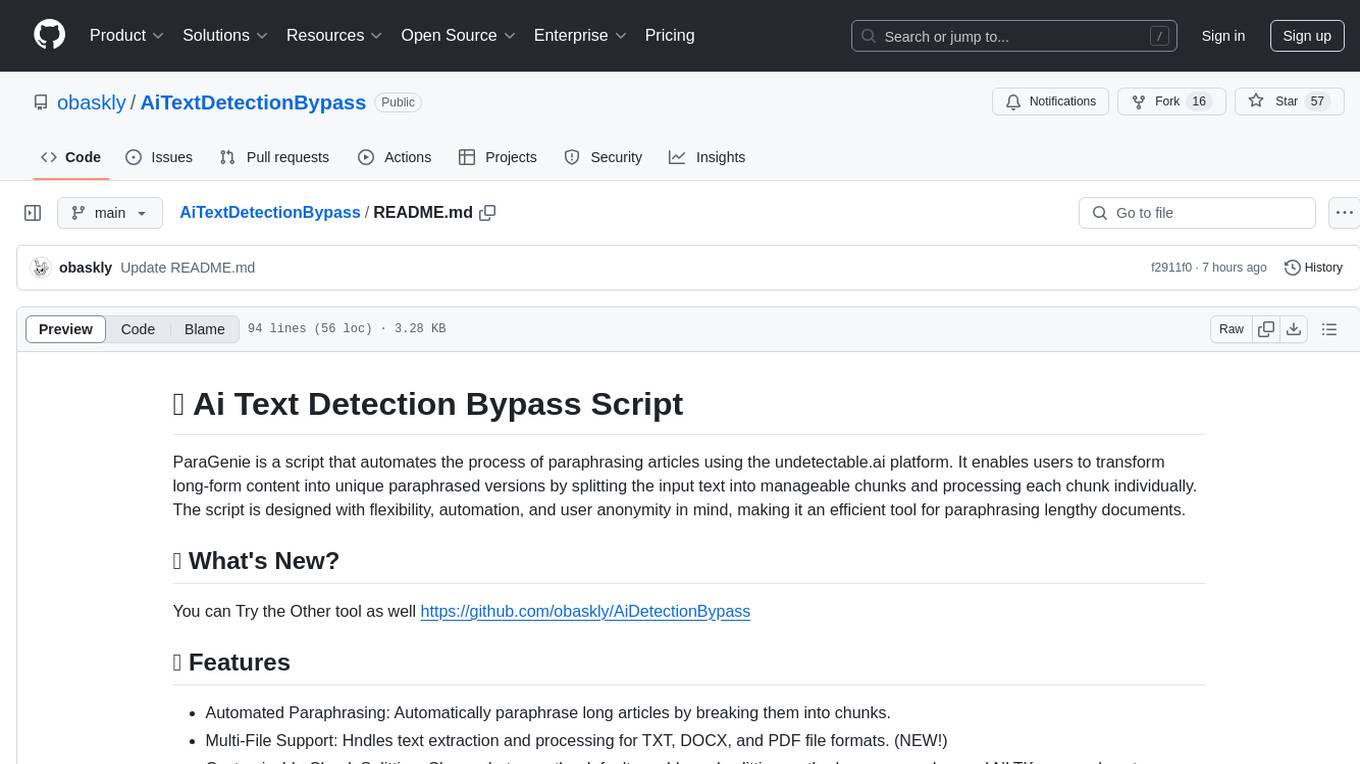
AiTextDetectionBypass
ParaGenie is a script designed to automate the process of paraphrasing articles using the undetectable.ai platform. It allows users to convert lengthy content into unique paraphrased versions by splitting the input text into manageable chunks and processing each chunk individually. The script offers features such as automated paraphrasing, multi-file support for TXT, DOCX, and PDF formats, customizable chunk splitting methods, Gmail-based registration for seamless paraphrasing, purpose-specific writing support, readability level customization, anonymity features for user privacy, error handling and recovery, and output management for easy access and organization of paraphrased content.
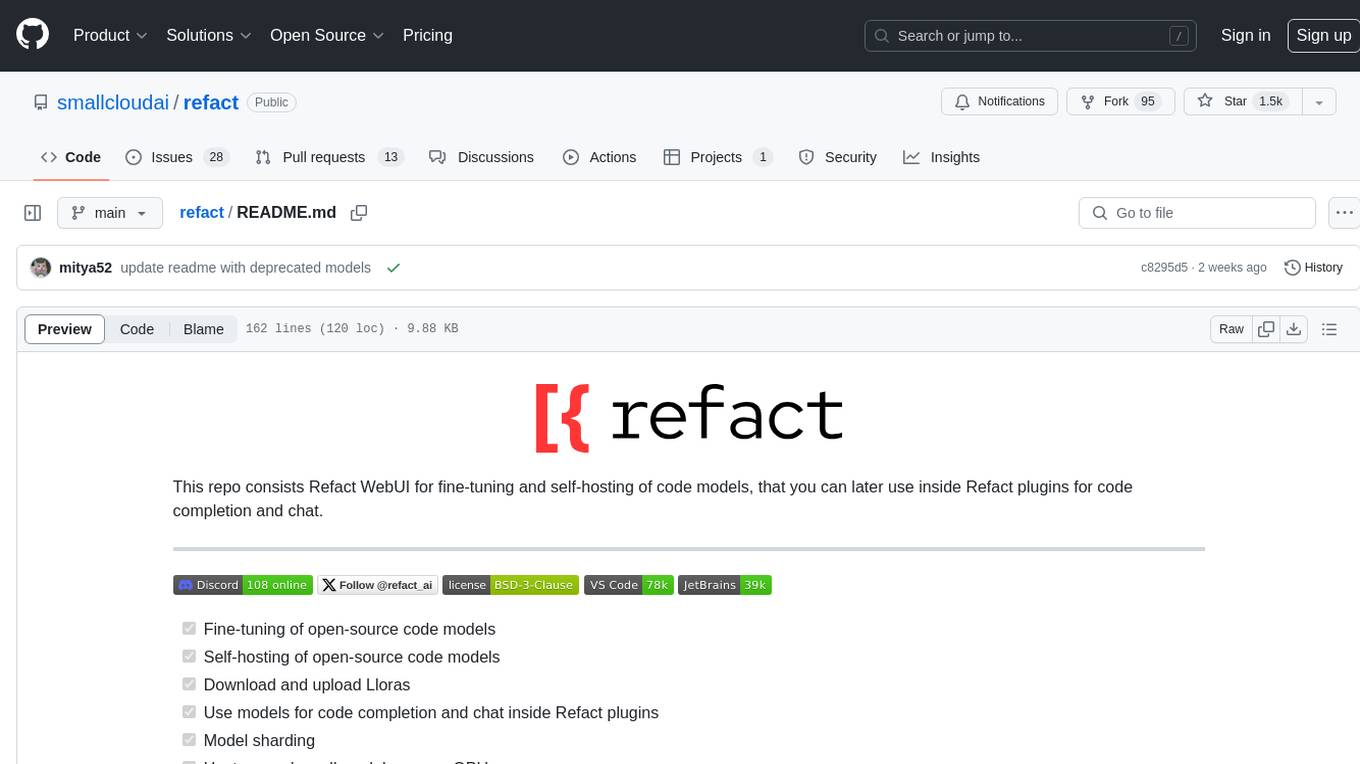
refact
This repository contains Refact WebUI for fine-tuning and self-hosting of code models, which can be used inside Refact plugins for code completion and chat. Users can fine-tune open-source code models, self-host them, download and upload Lloras, use models for code completion and chat inside Refact plugins, shard models, host multiple small models on one GPU, and connect GPT-models for chat using OpenAI and Anthropic keys. The repository provides a Docker container for running the self-hosted server and supports various models for completion, chat, and fine-tuning. Refact is free for individuals and small teams under the BSD-3-Clause license, with custom installation options available for GPU support. The community and support include contributing guidelines, GitHub issues for bugs, a community forum, Discord for chatting, and Twitter for product news and updates.
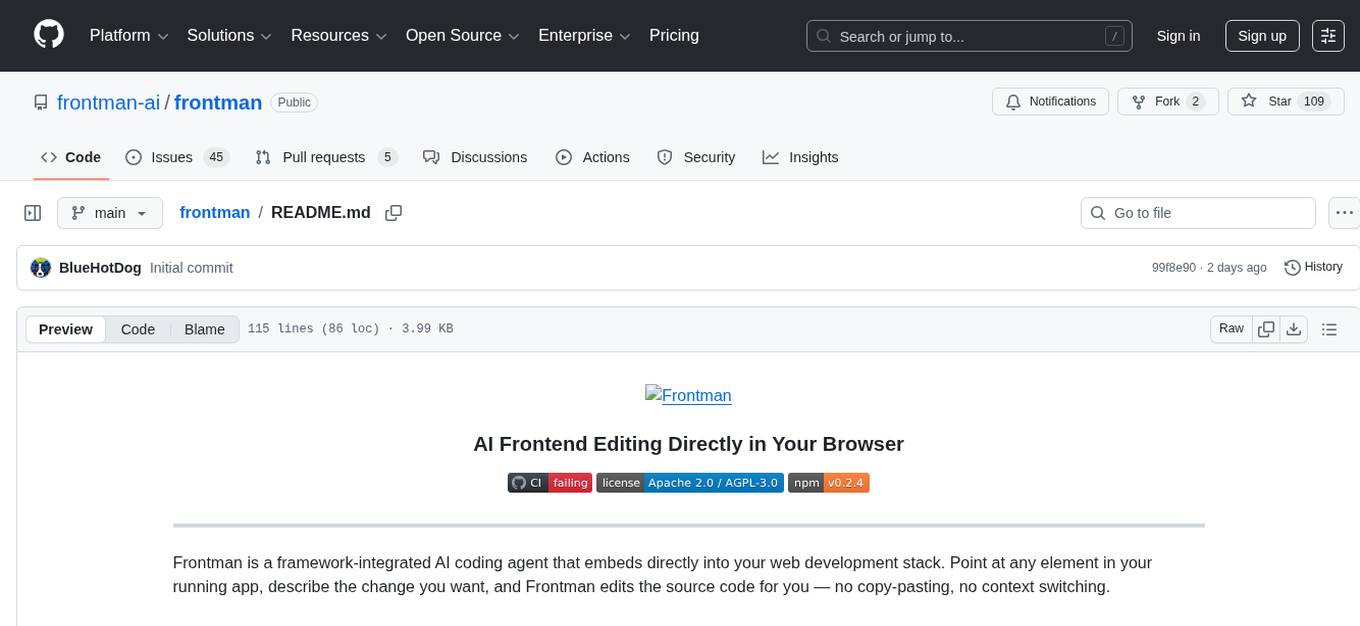
frontman
Frontman is a framework-integrated AI coding agent that allows users to edit their frontend directly in the browser. It enables users to point at any element in their running app, describe the change they want, and Frontman edits the source code for them without the need for copy-pasting or context switching. The tool supports popular frameworks like Next.js, Astro, and Vite, providing features such as point-and-click editing, real-time streaming of AI-generated edits, and framework-aware context. Frontman also offers an open protocol layer for decoupled and extensible client, server, and framework adapters.
For similar tasks

LLMStack
LLMStack is a no-code platform for building generative AI agents, workflows, and chatbots. It allows users to connect their own data, internal tools, and GPT-powered models without any coding experience. LLMStack can be deployed to the cloud or on-premise and can be accessed via HTTP API or triggered from Slack or Discord.

ai-guide
This guide is dedicated to Large Language Models (LLMs) that you can run on your home computer. It assumes your PC is a lower-end, non-gaming setup.

onnxruntime-genai
ONNX Runtime Generative AI is a library that provides the generative AI loop for ONNX models, including inference with ONNX Runtime, logits processing, search and sampling, and KV cache management. Users can call a high level `generate()` method, or run each iteration of the model in a loop. It supports greedy/beam search and TopP, TopK sampling to generate token sequences, has built in logits processing like repetition penalties, and allows for easy custom scoring.

jupyter-ai
Jupyter AI connects generative AI with Jupyter notebooks. It provides a user-friendly and powerful way to explore generative AI models in notebooks and improve your productivity in JupyterLab and the Jupyter Notebook. Specifically, Jupyter AI offers: * An `%%ai` magic that turns the Jupyter notebook into a reproducible generative AI playground. This works anywhere the IPython kernel runs (JupyterLab, Jupyter Notebook, Google Colab, Kaggle, VSCode, etc.). * A native chat UI in JupyterLab that enables you to work with generative AI as a conversational assistant. * Support for a wide range of generative model providers, including AI21, Anthropic, AWS, Cohere, Gemini, Hugging Face, NVIDIA, and OpenAI. * Local model support through GPT4All, enabling use of generative AI models on consumer grade machines with ease and privacy.

khoj
Khoj is an open-source, personal AI assistant that extends your capabilities by creating always-available AI agents. You can share your notes and documents to extend your digital brain, and your AI agents have access to the internet, allowing you to incorporate real-time information. Khoj is accessible on Desktop, Emacs, Obsidian, Web, and Whatsapp, and you can share PDF, markdown, org-mode, notion files, and GitHub repositories. You'll get fast, accurate semantic search on top of your docs, and your agents can create deeply personal images and understand your speech. Khoj is self-hostable and always will be.

langchain_dart
LangChain.dart is a Dart port of the popular LangChain Python framework created by Harrison Chase. LangChain provides a set of ready-to-use components for working with language models and a standard interface for chaining them together to formulate more advanced use cases (e.g. chatbots, Q&A with RAG, agents, summarization, extraction, etc.). The components can be grouped into a few core modules: * **Model I/O:** LangChain offers a unified API for interacting with various LLM providers (e.g. OpenAI, Google, Mistral, Ollama, etc.), allowing developers to switch between them with ease. Additionally, it provides tools for managing model inputs (prompt templates and example selectors) and parsing the resulting model outputs (output parsers). * **Retrieval:** assists in loading user data (via document loaders), transforming it (with text splitters), extracting its meaning (using embedding models), storing (in vector stores) and retrieving it (through retrievers) so that it can be used to ground the model's responses (i.e. Retrieval-Augmented Generation or RAG). * **Agents:** "bots" that leverage LLMs to make informed decisions about which available tools (such as web search, calculators, database lookup, etc.) to use to accomplish the designated task. The different components can be composed together using the LangChain Expression Language (LCEL).

danswer
Danswer is an open-source Gen-AI Chat and Unified Search tool that connects to your company's docs, apps, and people. It provides a Chat interface and plugs into any LLM of your choice. Danswer can be deployed anywhere and for any scale - on a laptop, on-premise, or to cloud. Since you own the deployment, your user data and chats are fully in your own control. Danswer is MIT licensed and designed to be modular and easily extensible. The system also comes fully ready for production usage with user authentication, role management (admin/basic users), chat persistence, and a UI for configuring Personas (AI Assistants) and their Prompts. Danswer also serves as a Unified Search across all common workplace tools such as Slack, Google Drive, Confluence, etc. By combining LLMs and team specific knowledge, Danswer becomes a subject matter expert for the team. Imagine ChatGPT if it had access to your team's unique knowledge! It enables questions such as "A customer wants feature X, is this already supported?" or "Where's the pull request for feature Y?"

infinity
Infinity is an AI-native database designed for LLM applications, providing incredibly fast full-text and vector search capabilities. It supports a wide range of data types, including vectors, full-text, and structured data, and offers a fused search feature that combines multiple embeddings and full text. Infinity is easy to use, with an intuitive Python API and a single-binary architecture that simplifies deployment. It achieves high performance, with 0.1 milliseconds query latency on million-scale vector datasets and up to 15K QPS.
For similar jobs

weave
Weave is a toolkit for developing Generative AI applications, built by Weights & Biases. With Weave, you can log and debug language model inputs, outputs, and traces; build rigorous, apples-to-apples evaluations for language model use cases; and organize all the information generated across the LLM workflow, from experimentation to evaluations to production. Weave aims to bring rigor, best-practices, and composability to the inherently experimental process of developing Generative AI software, without introducing cognitive overhead.

LLMStack
LLMStack is a no-code platform for building generative AI agents, workflows, and chatbots. It allows users to connect their own data, internal tools, and GPT-powered models without any coding experience. LLMStack can be deployed to the cloud or on-premise and can be accessed via HTTP API or triggered from Slack or Discord.

VisionCraft
The VisionCraft API is a free API for using over 100 different AI models. From images to sound.

kaito
Kaito is an operator that automates the AI/ML inference model deployment in a Kubernetes cluster. It manages large model files using container images, avoids tuning deployment parameters to fit GPU hardware by providing preset configurations, auto-provisions GPU nodes based on model requirements, and hosts large model images in the public Microsoft Container Registry (MCR) if the license allows. Using Kaito, the workflow of onboarding large AI inference models in Kubernetes is largely simplified.

PyRIT
PyRIT is an open access automation framework designed to empower security professionals and ML engineers to red team foundation models and their applications. It automates AI Red Teaming tasks to allow operators to focus on more complicated and time-consuming tasks and can also identify security harms such as misuse (e.g., malware generation, jailbreaking), and privacy harms (e.g., identity theft). The goal is to allow researchers to have a baseline of how well their model and entire inference pipeline is doing against different harm categories and to be able to compare that baseline to future iterations of their model. This allows them to have empirical data on how well their model is doing today, and detect any degradation of performance based on future improvements.

tabby
Tabby is a self-hosted AI coding assistant, offering an open-source and on-premises alternative to GitHub Copilot. It boasts several key features: * Self-contained, with no need for a DBMS or cloud service. * OpenAPI interface, easy to integrate with existing infrastructure (e.g Cloud IDE). * Supports consumer-grade GPUs.

spear
SPEAR (Simulator for Photorealistic Embodied AI Research) is a powerful tool for training embodied agents. It features 300 unique virtual indoor environments with 2,566 unique rooms and 17,234 unique objects that can be manipulated individually. Each environment is designed by a professional artist and features detailed geometry, photorealistic materials, and a unique floor plan and object layout. SPEAR is implemented as Unreal Engine assets and provides an OpenAI Gym interface for interacting with the environments via Python.

Magick
Magick is a groundbreaking visual AIDE (Artificial Intelligence Development Environment) for no-code data pipelines and multimodal agents. Magick can connect to other services and comes with nodes and templates well-suited for intelligent agents, chatbots, complex reasoning systems and realistic characters.